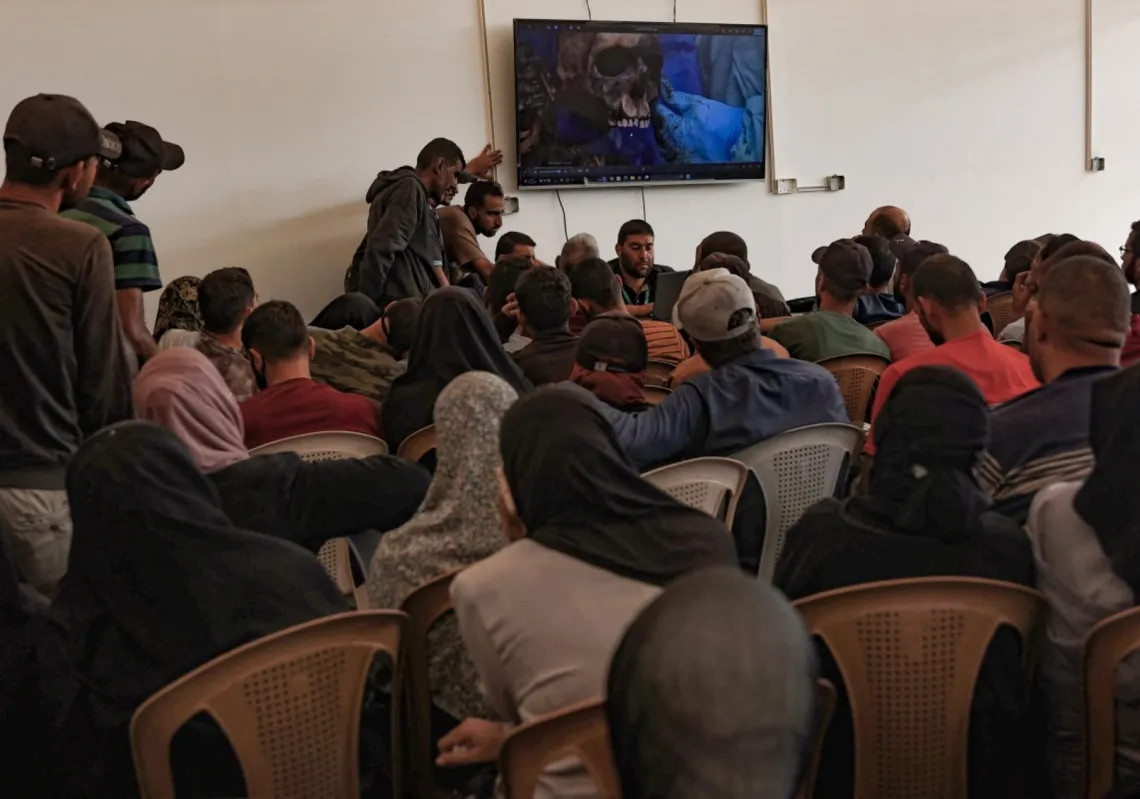 A Syrian refugee takes Syrian currency from the customers at his shop at the Za’atari refugee camp in the Jordanian city of Mafraq, near the border with Syria on February 21, 2013. (Reuters)[/caption]
A Syrian refugee takes Syrian currency from the customers at his shop at the Za’atari refugee camp in the Jordanian city of Mafraq, near the border with Syria on February 21, 2013. (Reuters)[/caption]
Bilal Hiyari was a restaurant manager. Within seconds of meeting him, he expresses how much he loves the heat of the kitchen, the pleasantries with customers, and the constant banter with his occasionally distracted co-workers. Since January 2014, he has been driving a taxi, chain-smoking during the fourteen-hour days he works to afford the rental fees charged by the vehicle’s owner. Fired from his job at a well-known restaurant in the Jabal Amman district of the Jordanian capital, Bilal was replaced by two very capable Syrian refugees. His 500-Jordanian-dinar (705-US-dollar) monthly salary, the industry standard, now pays for his two replacements. “The Syrians are experts in the hospitality industry,” he tells The Majalla. “They are excellent chefs, amazing sweet-makers, and well-trained in the restaurant business.” But Bilal is confident in his own skills, and knows the real reason for his dismissal was financial. “My boss now gets two dedicated managers for the price of one,” he says.
Bilal is one among many Jordanians who have suffered from the country’s recent economic downturn. Unemployment rates rose from 12.2 percent in 2012 to 14 percent in 2013. Already facing decreasing growth due to various structural weaknesses, the Hashemite Kingdom’s economic sectors are now truly feeling the reverberations brought on by the Syrian crisis. The impact on employment has been notable. Unemployed Jordanians and legal migrant workers face tough competition from the estimated 1.4 million Syrians now residing in the country. The adverse effects on the labor market are predicted to increase, with forecasts envisaging even higher poverty and unemployment rates in 2014–2015.
Since the violent escalation of Syria’s conflict in the spring of 2011, Jordan has maintained a generous ‘open-door’ policy. This has helped prevent a broader humanitarian disaster, but at a great cost to the country’s own citizens, as well as its budget. One recent study by think tank Konrad Adenauer Stiftung on the socioeconomic impact of the refugees on Jordan estimates the cost of the Syrian refugee crisis on the Jordanian economy to be somewhere between 11.5 billion–13 billion dinars (16 billion–18 billion dollars) during 2012–2014. There are undoubtedly certain under-publicized benefits accruing from the refugee influx. Wealthy Syrians have invested in the retail sector, spent on real estate, and increased the eligible labor pool for Jordanian businesses. The estimated aggregate benefit of the Syrian crisis on the Jordanian economy stands somewhere between 7.2 billion–7.9 billion dinars (10 billion–11 billion dollars) during 2012–2014. But the benefits accrue largely to private businesses. The government and vulnerable segments of the Jordanian population, on the other hand, are bearing the full brunt of the cost.
Paradoxes of informality
The cause of this disjuncture is multifaceted. While the direct costs of hosting Syrian refugees on public services such as education, healthcare and subsidized food are easily measured—extra pupils, additional patients and increased wheat imports are easily counted—what is far harder to calculate is the effect on informal private sector employment. Workers in this sector include employees of non-taxpaying enterprises, self-employed businessmen who do not pay taxes, domestic workers without regular contracts, casual workers without regular employment, temporary workers paid through contracting agencies, and unregistered employees of legal businesses. Mohammad Al-Momani, the minister of state for media affairs, aptly sums up the problem of the informal sector: “The dynamics of Jordan’s shadow economy are very hard to calculate,” he says. “It hurts the government not to get tax revenues from this sector.”
But the informal sector is also the largest employment category in Jordan after the public sector. Government data estimates that informal workers make up 44 percent of the total labor force in the national economy, as well as 55 percent of jobs in the private sector, close to 500,000 workers. The informal sector avoids taxation, regulation and observation. It attracts many foreign workers, as the low wages, meager benefits and tough working conditions are generally seen as undesirable by Jordan’s increasingly educated workforce. Nevertheless, informality has long offered a safety valve for Jordan’s most vulnerable, an escape for those unable to find formal employment. For Bilal, the 500 dinars he used to earn without benefits or a legal contract outweighed the lower wages he would have received if he had been formally employed.
The bulk of the benefits gained from the informal sector go to employers. They can accrue higher profits by offering lower wages, imposing longer working hours, and evading tax liabilities. For workers, unregulated working conditions can lead to various abuses. For the government, uncollected taxes and social security contributions mean less public revenues. The country’s Ministry of Labor and its Social Security Corporation were deprived of 325 million dinars (459 million dollars) in revenues due to informally employed Syrian refugees during 2013. Though Momani believes “Jordan may be stronger economically than we think” due to the unregulated and informal economic activity, he also knows the indirect costs of informality are hurting the country in ways that are not easily quantified. For Momani, “the citizenry and the government are left to bear the brunt of the cost.”
The problem now may be too much competition in this supposedly burgeoning sector. Hussein Abu Rumman, research director at the Al-Quds Center for Political Studies tells The Majalla that “Syrians are hard workers and they have a well-known expertise in the service sector, especially with food and sweets.” He says he cannot walk down the streets of Jabal Al-Hussein, a middle-class neighborhood in Amman, without hearing Syrian accents at the various fruit stands and small shops that fill the area. “The informal sector is crucial to the survival of the Jordanian working class,” he says. “The refugees’ impact here is very hard to quantify. Benefits accrue mainly to wealthy business owners and family members who utilize cheap labor while evading taxes . . . Unauthorized watermelon sellers, the tutors giving after-school lessons, the jameed (hard dry yogurt used in various Jordanian dishes) makers of Karak, the labneh producers of Jerash, are slowly being crowded out.”
The Syrian Menace?
Samer, who preferred to not give his last name, is the gentle face of the “Syrian menace” certain Jordanian politicians deplore and many citizens fear. Born and raised in the city of Dera’a, he moved to Damascus to find a job in 2001. He left Syria in September 2012, as violence escalated between Syrian troops and opposition forces in the Damascene suburb of Daraya where he lived. After a brief stint in the Za’atari refugee camp, he was sponsored by a family friend and allowed to leave. He has lived in a poor neighborhood in East Amman ever since.
Samer has always worked. He started as a carpenter, spent time as a bartender, worked as a baker, and repaired home appliances before settling at a restaurant, where his charm and good looks made him a hit among the clientele. Accustomed to earning a living, Samer cannot fathom spending his days seeking out assistance from charitable organizations. He knows he is lucky; young, able-bodied and ambitious, he quickly found a job through distant relatives. His boss is happy to pay him his 175-dinar (247-dollar) monthly salary under the table, saving on tax contributions and compensating him less than his Jordanian co-workers. But his monthly expenses do not add up. Rent and transportation alone set him back around 150 dinars (212 dollars). Rising prices, stagnant wages and limited opportunities are common gripes in Jordan’s cities.
Mounting costs and overstrained government services have led to increased tensions between Syrian refugees and host communities. Already in September 2012, a nationwide poll conducted by the Center for Strategic Studies at the University of Jordan found that 65 percent of Jordanians were opposed to allowing more Syrians into the country, while 80 percent preferred to see them confined to camps. By July 2013, these numbers had grown to 73 percent and 87 percent respectively. Much of the tension is linked to economic difficulties. The editor-in-chief of Jordan Business, Marwan Kardoosh, outlines the problem: “The crisis’ bearing on the government’s deficit is well-known, but it is in host communities where the refugees’ impact is most acute.”
Competition over informal jobs is increasing exponentially. The International Labour Organization (ILO) estimates that some 160,000 Syrian refugees are working illegally in Jordan, mainly in the agricultural, construction and service sectors. Since employers have increased access to cheaper foreign workers, the incentives to employ Jordanians are few and far between. Registered Syrian refugees receive charitable donations and food vouchers from international organizations, and as a result, “many are willing to accept lower wages than Jordanians,” Kardoosh tells The Majalla. All the while, business owners reap the benefits of the refugee influx while poor Jordanians suffer the externalities of a growing labor pool.
And there is little the Jordanian state, or the international community, can do. Government spending can help build new schools, refurbish old hospitals and renovate other decaying infrastructure. Foreign aid can help feed the hungry, clothe the destitute and ameliorate the growing deficit. What neither can do is offer a sustainable solution to help those in a sector characterized by its obscurity and evasion of legal parameters. As one recent report by Jordan’s Ministry of Planning makes clear, “this lack of information hinders policymakers,” actions formulated and implemented to reduce poverty “might not result in the desired outcome.”
According to the ILO, Syrian laborers have “put a downward pressure on wages in the informal private sector, where wages were already low.” Poor segments of the Jordanian population are struggling to get by. In a dusty bakery in downtown Mafraq, a northern city whose population has increased nearly five-fold since 2011, bakery owner Hussein conveys dejectedly the impact of Syrian refugees on the local community: “We are losing our livelihoods. The Syrians benefit from foreign aid and take Jordanian jobs,” he tells The Majalla. Local business owners facing tough economic times often have no choice but to employ them. “My bakery only employs Jordanians but many others have replaced locals with Syrians willing to work for half the price,” he says, adding that all Jordanians can “taste and feel the problem.” Employment numbers do not always reflect the intensity of the crisis. “Few of the small businesses here pay taxes or legally register all their workers,” he says. “The state makes the cost of formality far too high.” Jordanian host communities have been deprived of some 100,000 jobs, according to the Konrad Adenauer Stiftung study.
At a recent seminar in Amman held by the Economic Research Forum (ERF), a regional network dedicated to research on the Middle East, ERF fellow and University of Minnesota Professor Dr. Ragui Assaad outlined the complexities of labor market reform in Jordan. In a policy panel discussion in June, Assaad pointed out that while reforms to labor laws had successfully increased temporary formal employment, the cost of formality remained too high. “Fixed costs imposed by formal rules really hurt informal businesses,” he says. At the moment, there is little incentive for small enterprises to become legal. “If increasing employment amongst Jordanians is the goal, hiring foreign workers should be made more costly.”
The labor market issue is political at its core. “Presently, the government listens more to the needs of the private sector than to those of Jordanian workers,” Assaad says. Over time, the Jordanian economy has become biased towards those sectors that depend most on cheap, foreign labor, and the preferences of well-connected businessmen have taken precedence over the needs of the citizenry. “Every day, I am more convinced that Jordan suffers from structural problems that require broad, economy-wide solutions,” Assaad says.
Is Success Possible?
Jordan’s National Resilience Plan, drafted in response to the Syrian crisis, requests 101 million dollars to create better job opportunities and revive local economies affected by the refugee influx. The Ministry of Planning and International Cooperation has stated that Jordan wants to “transform the informal sector to the formal sector,” yet no clear end-goal is visible in the government’s day-to-day dealings. The Jordanian government seeks to re-imagine the urban poor as budding micro-entrepreneurs. National policy documents emphasize empowerment and ingenuity. If unshackled and legalized, the informal sector can become an engine for growth.
Yet the problems regarding the precise measurement of this success remain, with no specific criteria available to determine the beneficiaries of government assistance. It also remains unclear whether a better solution would be to push informal enterprises into the formal sector, or if enhancing prospects in the informal sector would be more effective long-term.
For the moment, Syrians continue to flood Jordan’s informal labor market, putting downward pressure on already low wages. Various businesses, both large and small, have benefited. The refugee influx is imposing a hidden cost on the Jordanian economy. And the negative consequences are accruing largely to the most vulnerable segments of Jordan’s population, the working poor. Poverty levels, currently at 14 percent, will very probably grow, as half the income of poor Jordanian families is derived from wages.
The interests sustaining informality are powerful. The increasing profit margins for business owners are widely documented. The direct expenses incurred by the Jordanian government are well-known. It may be high time for the government to ponder the informal sector and the hidden costs of the refugee crisis on the Kingdom’s working class.









